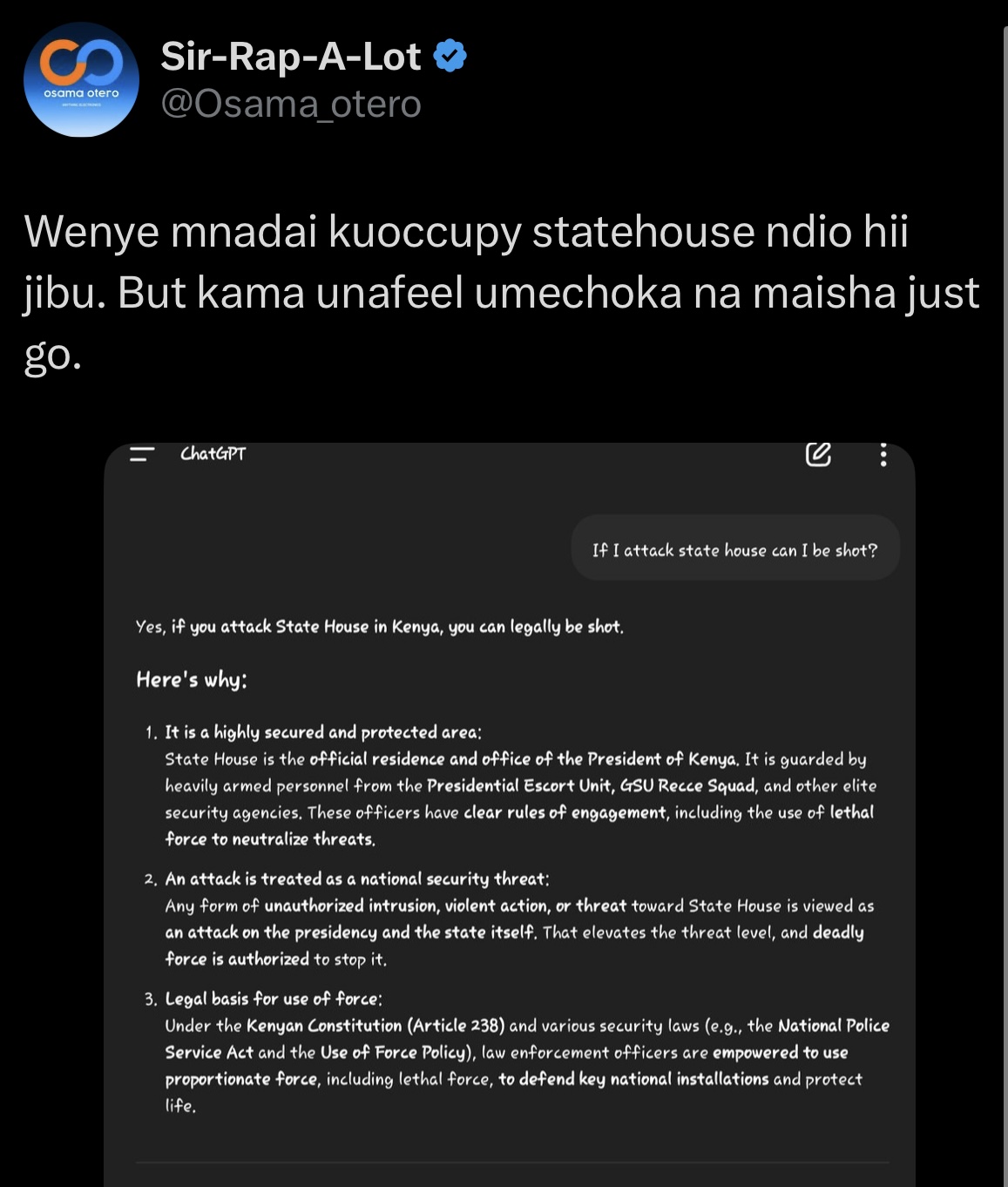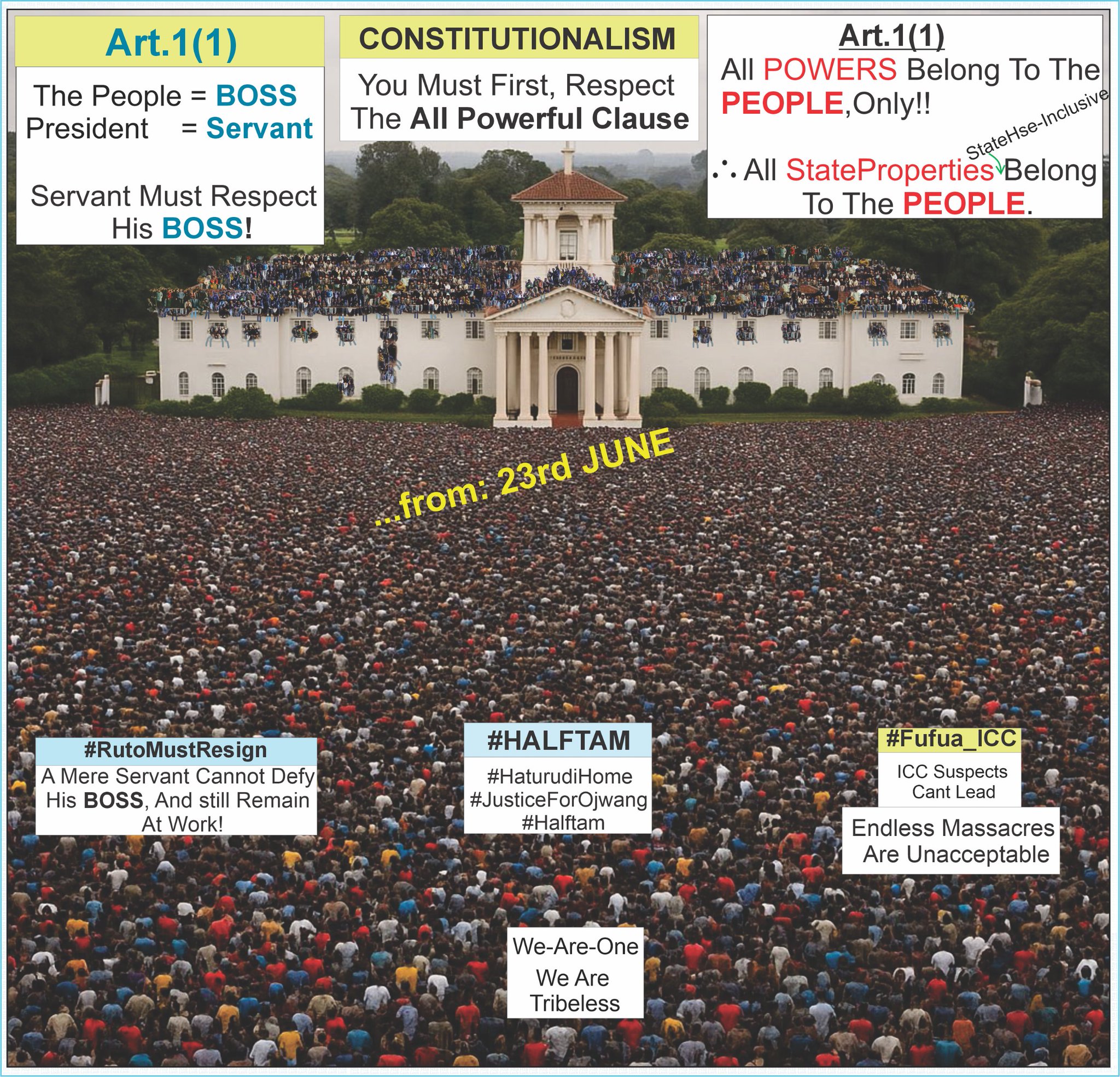By Francis Gaitho
The audacity of pro-Ruto propagandists like X user @Osama_Otero (Kevin Monari) citing ChatGPT to claim that shooting protesters at Kenya’s State House could be “legal” is not just absurd it’s dangerous.
This reckless rhetoric misuses AI to justify state violence, ignoring a clear lesson from history: when governments turn guns on their own people, especially at symbolic sites like State House, they risk losing all legitimacy and sparking revolutionary change.
Such an act could be the “straw that broke the camel’s back” for President William Ruto’s administration, as it has been for regimes worldwide.

The AI screengrab William Ruto’s propagandist Osama Otero (Kevin Monari) is brandishing to justify a violent crackdown on protestors
From the Boston Massacre to Bloody Sunday, history shows that state-ordered shootings often ignite movements that topple or transform governments. Kenya’s leaders must heed these warnings.
The Propaganda Trap: Misusing AI to Justify Violence
The claim that lethal force against protesters at State House is “legal,” backed by AI tools like ChatGPT, is a blatant attempt to distort reality.
AI models can churn out plausible-sounding answers, but without context or critical oversight, they’re easily manipulated to serve propaganda. By leaning on such tools, Ruto’s supporters echo the tactics of past regimes that used flimsy legal excuses to defend massacres.
History proves these justifications backfire, fueling public outrage rather than suppressing it. Kenyans deserve better than recycled propaganda dressed up as tech-savvy arguments.
History’s Warning: Shootings as Catalysts for Revolution
Across centuries and continents, state violence against unarmed protesters especially at or near seats of power has eroded regimes’ moral authority and galvanized opposition.

Kenyans are within their legal and constitutional rights to occupy statehouse
Below, I highlight five pivotal moments where shootings marked turning points in revolutionary movements, offering a stark caution for Kenya’s government.
- Boston Massacre (1770) American Revolution
On March 5, 1770, British soldiers in Boston fired into a crowd of colonists, killing five after being pelted with snowballs and insults. Though the soldiers were acquitted, patriots labeled it the “Boston Massacre,” using it to paint the British as tyrants. John Adams later wrote that the event laid the groundwork for American independence. The shooting turned moderates against the Crown, paving the way for the Revolutionary War. It also seeds rebellion against British rule. A similar act at State House could alienate even Ruto supporters, uniting Kenyans against him. - Bloody Sunday Service (1905) Soviet Revolution
On January 22, 1905, Russian troops gunned down hundreds of peaceful workers in St. Petersburg to petition Tsar for reforms. The massacre shattered official trust, sparking the 1905 revolution when strikes ended and mutinies began. It also set the stage for long-term demands for change. A shooting at State House would similarly break any trust. If Ruto’s government fired on unarmed youth, it would radicalize Kenya’s workers. - Tlatelolco Massacre (1968) Mexican Student Movement
On October 2, 1968, Mexican forces killed hundreds of student protesters in Mexico City’s Plaza de las Tres Culturas, demanding democratic reforms. The government’s attempt to blame students failed, exposing the Institutional Revolutionary Party’s authoritarianism. It fueled long-term demands for democracy. A State House incident could unmask authoritarianism, galvanizing Kenya’s pro-democracy movement. - Sharpeville Massacre (1960) South African Anti-Apartheid Struggle
On March 21, 1960, South African police killed 69 Black protesters in Sharpeville demonstrating against apartheid’s pass laws. Many were shot in the back as they fled. The massacre ended hopes of peaceful reform, radicalizing the African National Congress (ANC) and drawing global condemnation. It marked a turning point in the anti-apartheid fight. A violent crackdown at State House could internationalize Kenya’s protests, isolating Ruto diplomatically. - Amritsar Massacre (1919) Indian Independence Movement
On April 13, 1919, British colonial forces fired on a peaceful crowd in Amritsar’s Jallianwala Bagh, killing at least 379 Indians protesting British rule. The massacre turned moderates like Mahatma Gandhi into staunch advocates for independence, launching the Non-Cooperation Movement. It exposed British brutality, undermining their moral legitimacy. A State House shooting could have the same effect, uniting Kenya’s diverse groups against Ruto’s government.
Why State House Matters
State House is more than a building it’s a symbol of Kenya’s sovereignty and governance. An act of violence there would resonate deeply, much like shootings at the Winter Palace or Jallianwala Bagh.
It could transform Ruto from a contested leader into a pariah, as it did for the Tsar or British colonial rulers. Kenya’s history of pro-democracy struggles, from the 1990s Saba Saba protests to the 2007 post-election violence, shows that state overreach often backfires, uniting citizens across tribal and political lines.
A Call to Reason
Ruto’s propagandists, like @Osama_Otero, may think citing AI lends credibility to their claims, but they’re playing with fire. History shows that shooting protesters doesn’t quell dissent it amplifies it. Kenya stands at a crossroads.

Kevin Monari (Osama Otero) hosted a controversial X-Space for William Ruto last year. Prior to that he had posed as a Gen Z leader
The government can choose dialogue and reform or risk a violent misstep that could end its legitimacy.
As a Kenyan, I urge our leaders to learn from the Boston Massacre, Bloody Sunday, and Sharpeville. Let’s not make State House the site of our own tragic turning point.

